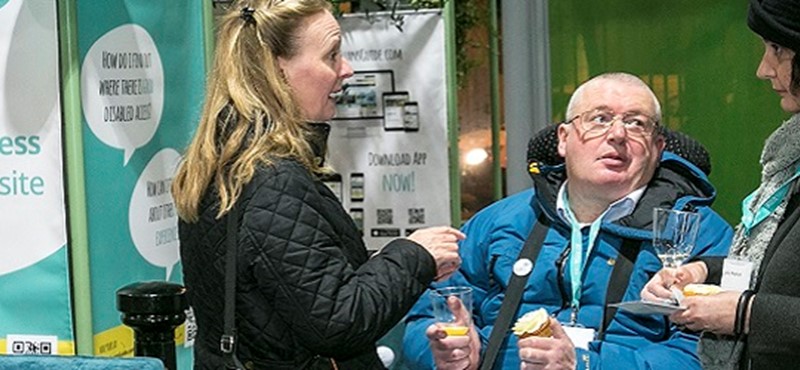Reviewer's Story: Brian Seaman interviews Liam Dwyer

Liam Dwyer has been reviewing on Euan’s Guide for a few years and has shared his experiences of accessibility in hotels in Telford and Barcelona, and most recently, Las Vegas. A few years ago, Liam participated in an interview with Brian Seaman, a great friend of Euan’s Guide and Access Advisor at Access New Business; and we enjoyed it so much that we thought it would be good to show it again to hear Liam’s thoughts on Motor Neurone Disease (MND) and his experiences of accessibility on public transport and beyond.
Listen out for Liam’s mention of the fantastic access in Barcelona and read his review of Hotel Illunion which he reviewed on a return visit just last year!
Transcript: Other People’s Shoes #OPS1 – An interview with Liam Dwyer by Brian Seaman
Today I’m introducing Liam Dwyer, and I’m going to ask him a few questions about his life and his thoughts on life.
1. What motivates you to spread the word about MND?
The biggest motivation for me, has to be the lack of awareness for this disease. The MND association has to raise the cash to meet the shortfall for government services because people die from this disease so fast without getting the right equipment. I consider myself lucky surviving so long, so there is no point in sitting back and feeling sorry for myself when people with this disease are dying around me.
2. Can you give me some little known facts about MND please Liam?
MND has no known cause or cure. In 1874 the first case was diagnosed. And for sufferers like me we are no further on in finding a cure. 5 people get MND every day in the UK alone. The average lifespan is 14 months.
3. Is there any sign of a cure on the horizon for people with MND?
Despite all the research for Motor Neurone Disease around the world also known as Lou Gehrig’s Disease or ALS, there is no cure in the near future. Even if there were, it would still be years before it would be approved to filter down to the patients. MND is on the rise in the UK, and that’s a known fact. What the research needs is a cash injection from the government before it becomes more widespread, not alone in the UK but all over the world.
4. Thank you Liam. I know that you use the railway to travel, do you feel that public transport has improved?
Speaking as a Southern Rail user. The improvements which they have made is amazing for wheelchair users. Every year they are opening new lifts at stations. This is good for everyone, not just the disabled. What I have found about Southern Rail is they listen, and are willing to improve in any way they can to make travel easy.
5. That’s really good to hear Liam. Have you noticed any other changes to facilities in recent years?
The changes are happening although very slow I feel. Local councils need to carry out work as standard and not just when their back is in a corner. What I mean by that is it has taken two years, despite having almost turning my wheelchair over and a petition from all the residents in the road just to get a footpath suitable for purpose. The footpath was so narrow that I could not get all my wheels of the wheelchair on the path. You have mums and dads pushing young children in buggies, and old people using the path, all finding it hard. The dropped kerbs had a step anything from 50-75mm.
6.That’s obviously quite a barrier there Liam. Do you think that non-disabled people have a better understanding of disability since the London 2012 Paralympic Games?
Every bit of awareness for disabilities is welcome as far as I’m concerned. I personally think that the Paralympic Games opened people’s eyes, but unless we keep disability in the foreground people seem to forget how hard it is for the disabled.
7. That’s true. I gathered you took a holiday recently, how accessible was it there?
I have always rated London for accessibility but my first visit to Barcelona this year would put London to shame. Access around the city was made so easy with good access to all areas in general. The only complaint that I would have about Barcelona is their toilets are too low, and the lack of wheelchair friendly toilets are few. The number of hotels set up for wheelchair users are limited. But the trams and bus services are amazing. I would guess 95-97% of metro stops were wheelchair accessible. A lot of people don’t have good reports for budget airlines, but the service we got from EasyJet at Gatwick Airport and at Barcelona Airport from the ground crew and staff was amazing.
8. That’s really good Liam, it’s nice to hear that and really positive news. If I could ask you, in your life who are your role models please?
As such I don’t have any role models, but I do admire Professor Stephen Hawking. Living with Motor Neurone Disease for so long a body failing leaving you with a perfect mind is so hard.
9. Thank you Liam, I can understand that. What advice would you offer someone else based on the experiences of your own life?
Live life to the full. Don’t sit back and say I wish I had done that. I can count on one hand the days off sick from work in my working career. And now I’ve got a terminal disease. No one knows what’s around the corner for us in life.


 Follow Euan's Guide on Instagram
Follow Euan's Guide on Instagram
 Follow Euan's Guide on LinkedIn
Follow Euan's Guide on LinkedIn
 Follow Euan's Guide on Facebook
Follow Euan's Guide on Facebook


Comments
You have to be signed in to leave a comment.
Login / Signup